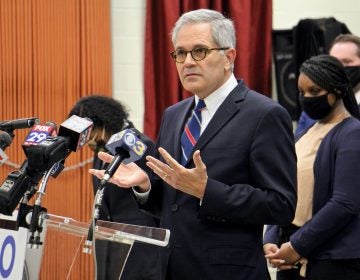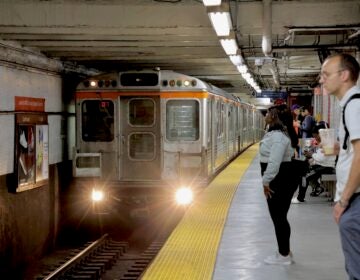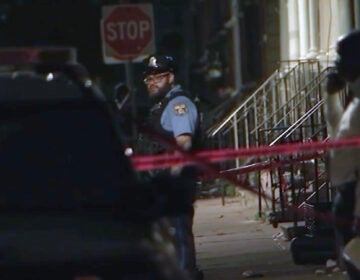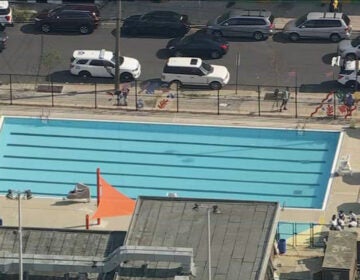Future of Philly’s fight to enact local gun laws is now in the hands of state court
State law prevents Philadelphia from enacting its own gun control measures. A new lawsuit against the General Assembly aims to change that.
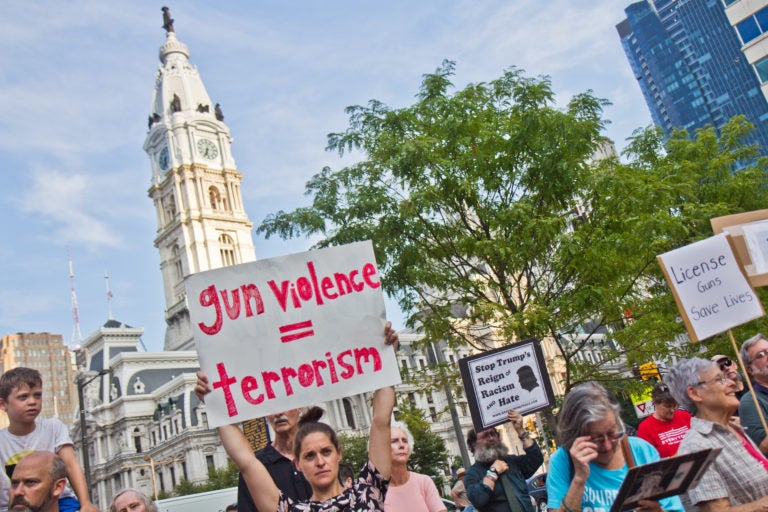
Protestors with CeasefirePa gathered at Love Park in Philadelphia in August 2019 to stand against gun violence nationally and locally. (Kimberly Paynter/WHYY)
A panel of state judges is now considering whether Philadelphia’s fight to enact its own gun control measures should move forward in Commonwealth Court — or be dismissed.
During a virtual hearing on Wednesday, lawyers for the city argued the state preemption laws that make it illegal for Philadelphia to pass local gun laws should be invalidated because they put lives at risk, particularly in the communities of color most impacted by gun violence.
Attorney Alex Bowerman told the panel those measures are unconstitutional because residents have the legal right to “enjoy and defend life and liberty” under the Pennsylvania constitution.
Preventing cities like Philadelphia from enacting laws aimed at curbing gun violence, including permit-to-purchase regulations and limits on bulk gun buying, infringes on the constitutional right to defend life and liberty, he said.
Especially amid a historic surge in gun violence, which is putting Philadelphia on pace to set a new single-year record for homicides.
“People are dying at an alarming rate and it’s because of the respondents’ actions in this matter,” said Bowerman during the hourlong hearing.
The city’s lawsuit, joined by CeaseFire Education Fund and nearly a dozen people who have lost loved ones to gun violence, also argues that Philadelphia and Pittsburgh should be permitted to pass stricter gun control legislation because cities have a legal responsibility to “protect the health, safety and quality of life of its citizens,” according to the lawsuit.
Bowerman reiterated that point during Wednesday’s hearing.
Lawyers for the case’s respondents, including the Pennsylvania General Assembly, told the panel the petition is composed of “policy questions” that should be resolved by the legislative body, not the courts. They argued that residents and organizations that take issue with the state’s firearm preemption laws should lobby lawmakers for new legislation.
“That’s what the General Assembly is for,” said Mark Bradshaw, one of the attorneys representing House Speaker Bryan Cutler (R-Lancaster), another respondent.
“The hard reality is that this was an issue that was decided through the Democratic process,” said Thomas Collins, one of the lawyers representing the General Assembly.
He added that other courts have sided with the state and the General Assembly when Pennsylvania’s firearm preemption laws were challenged.
For example, in 2007 then-City Councilmembers Darrell Clarke and Donna Reed Miller sued the state in response to a surge in gun violence. They argued the General Assembly stopped the city from enforcing stricter gun control measures. Police recorded 391 murders that year.
The suit was eventually dismissed by a panel of judges in Commonwealth Court, which ruled 4-1 that the city could not institute its own gun control measures because of state preemption laws “imposed by the legislature.”
In the 1990s, former City Councilmembers Angel Ortiz, David Cohen, and Jannie Blackwell sued the state after an unsuccessful attempt to ban assault weapons in Philadelphia.
A similar case in the 1970s also failed.
“In all of these cases, the constitutionally [of the preemption regulations] has been upheld by the courts,” said Collins.
The virtual hearing comes nearly eight months after Philadelphia filed its lawsuit.
It could be weeks, possibly months, before there’s a ruling in the case.
If the city’s suit is dismissed, it has the option to file a petition requesting the Supreme Court of Pennsylvania hear the case. If the case is permitted to proceed, lawyers for the respondents would not be able to appeal until there is a final ruling in a case, said Bowerman.
WHYY is your source for fact-based, in-depth journalism and information. As a nonprofit organization, we rely on financial support from readers like you. Please give today.




